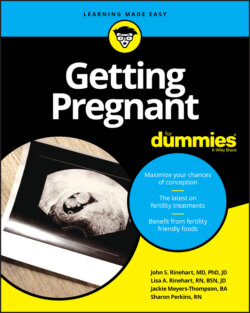Читать книгу Getting Pregnant For Dummies - Sharon Perkins - Страница 79
Giving up smoking
ОглавлениеSmoking is bad for you. We all know it. Yet roughly 14 percent of women and 18 percent of men in the United States still smoke. While cigarette warning labels tell you they are addictive, they do not tell you that smoking impacts your reproductive health. Need some good reasons to quit? Here are a few:
Women who’ve smoked more than 100 cigarettes in their lifetime have a 14 percent greater risk of infertility.
Smokers take longer to conceive.
Smokers increase their relative risk for miscarriage by 1 percent for each cigarette they smoke a day. So, if you are 35 years old, you have a 20 percent chance of miscarriage (in general). If you smoke five cigarettes a day, you now have a 25 percent chance of miscarrying. But former smokers have the same risk of miscarriage as those who have never smoked, so quitting can really make a difference!
Smokers are two to four times more likely to have an ectopic pregnancy (one that implants in the fallopian tube rather than in the uterus, a topic we discuss in detail in Chapter 13) as smoking alters the structure and function of the tubes.
Smokers go through menopause earlier because smoking increases free radicals. Free radicals are substances that kill all cells, including eggs, decreasing the number of years pregnancy can occur. Smokers go through menopause three to four years earlier than nonsmokers. This could mean that a 38-year-old smoker is more like a 42-year-old nonsmoker, which, based upon age, would represent a significant decline in fertility.Smokers also have lower AMH (anti-muellerian hormone) levels than nonsmokers undergoing IVF. AMH is a protein made by egg units (follicles). More egg units means higher AMH, and in terms of eggs, more is always better than fewer. (We talk more about the impact of AMH in Chapter 11.)
Smokers’ eggs have more genetic abnormalities.
Smokers’ eggs are prone to polyspermy, where two or more sperm enter an egg. The embryos that result are chromosomally abnormal and will not grow.
If you’ve quit but your partner hasn’t, he may want to consider the following:
Men who smoke have a lower sperm count.
Men who smoke have a 20 percent decrease in sperm motility.
Smokers’ sperm have more abnormal shapes. Abnormally shaped sperm have a higher rate of chromosomal abnormalities.
Secondhand smoke exposure during pregnancy increases miscarriage rates by 11 percent.
Many studies have demonstrated that smokers have lower success rates for the treatments for infertility. Bottom line: stop smoking!
